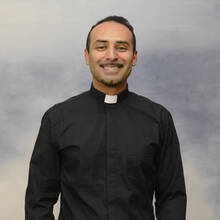What does the church need now?
“There are no coincidences,” as the saying goes. Pope Francis’s recent death invites reflection on the office of Peter’s successor. This Sunday’s readings, meanwhile, are grounded in the shifting experiences of Peter the Apostle. The readings invite us to consider the evolving nature of church leadership, which has been a topic of discernment since the time of Jesus. The office of Peter’s successor is a symbol of the church’s ongoing discovery through shifting eras of who it is and what it needs. Today’s Gospel illustrates what it means for Peter to be first among equals and servant of all.
“Someone else will dress you and lead you where you do not want to go” (Jn 21:18).
How important is it for the next Pope to face his own fragility?
In what ways will the future call on the church to trust in divine providence?
Where is your faith calling you towards a more genuine solidarity?
“Stop teaching in that name,” the Sanhedrin told the apostles in this Sunday’s first reading (Acts 5:28). By this time, Peter had recovered the courage that he had lost at Jesus’ trial, and he responded to them with boldness, “We must obey God rather than men” (5:29). Just a few weeks ago, the church recounted Peter’s struggle to accompany Jesus in his final hours. In the aftermath of the resurrection, Peter found new boldness to speak even under threat of punishment. Much of the fear that Peter possessed before the resurrection gave way not just to certainty, but to a growing courage.
This Sunday’s Gospel reading might explain where Peter’s courage came from and how it developed even within his own lifetime. In this last chapter of John’s Gospel, Peter completes his transition from fishermen to the shepherd. Peter’s role shifts from that of a missionary going out to catch souls and haul them into the boat to one of a pastor guarding a flock. This shift in role required a change in attention as well. In addition to a missionary’s focus on the world outside the community, Peter had now to attend to the needs within.
These two roles appear as distinct scenes in this Sunday’s Gospel. Scene one depicts Simon the fisherman. Left with the hope of the resurrection, but little other sense of direction or purpose, Peter goes back to his old way of life. “I am going fishing,” he says to the other apostles, several of whom join him (Jn 21:3). What followed was a miraculous haul of fish and an encounter on the shore with the risen Christ, whom they found waiting to have breakfast with his friends and companions. “Children,” asked Jesus, “have you caught anything to eat?” (Jn 21:5). This Peter, the skillful fisherman and sailor, is the familiar character from the early Gospels.
With the shift of scene from waters to shore, Peter’s life is transformed. “Feed my lambs,” Jesus tells him, and “Tend my sheep” (Jn 21:15-16). The image jolts the imagination, for in the space of a few verses Peter moves from hauling fish to pastoring sheep. The moment only suggests what Peter will become, for he has not yet grown into his role as chief shepherd. The passage hints at the inevitable growth of the community and the development of its needs even within the first generations.
Peter’s successor today is the symbol of church unity. Insofar as it is possible, he must become all things to all people as the moment demands. Following in Peter’s footsteps, his next successor might even have to go to places not imaged before. “Someone else will lead you,” said Jesus, “where you do not want to go” (Jn 21:18). If love for the risen Christ is real, then the next pope will respond with Peter’s same transformation and courage. “Lord, you know everything; you know that I love you” (Jn 21:17).
Pope Francis, shepherd of the people, pray for us.







